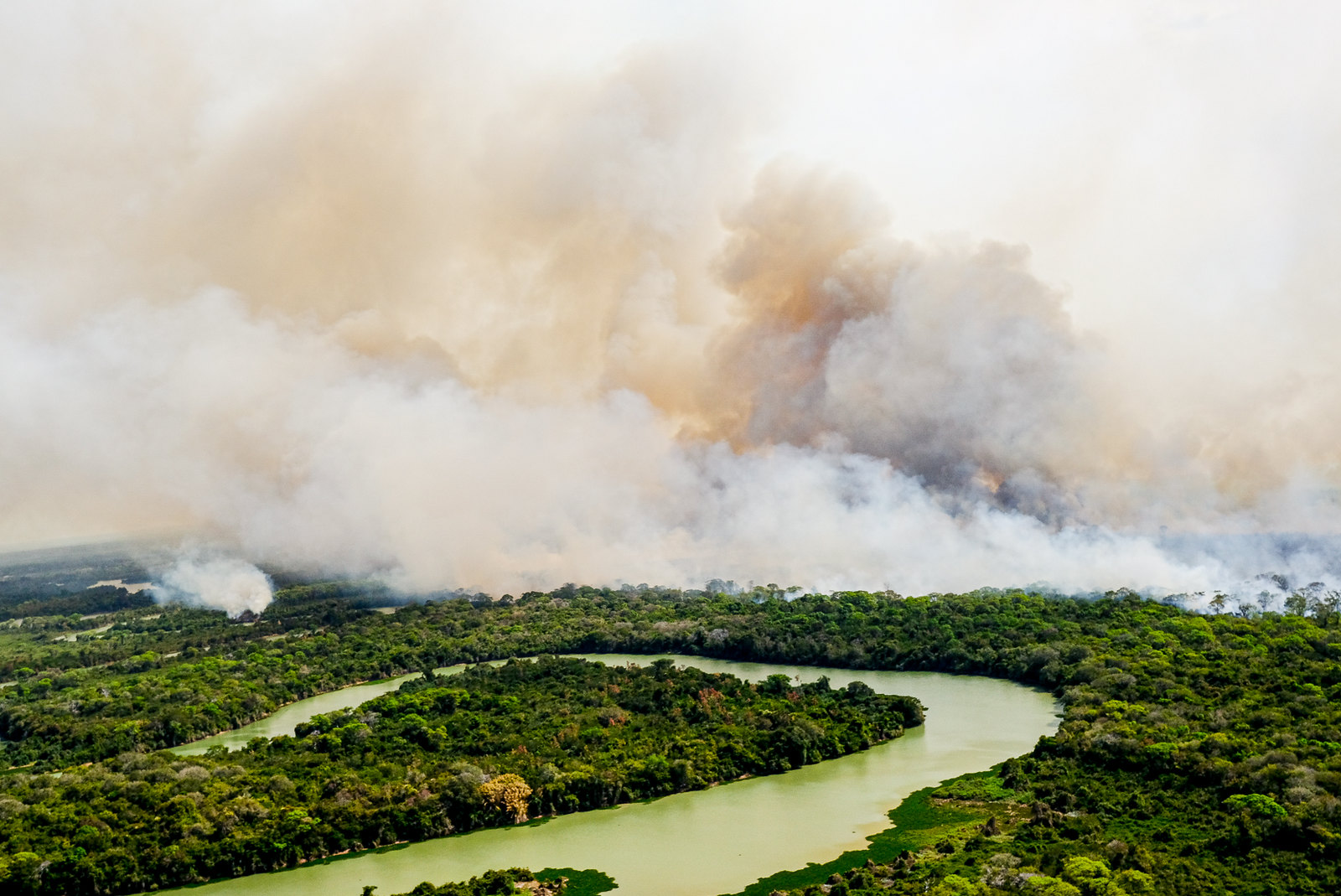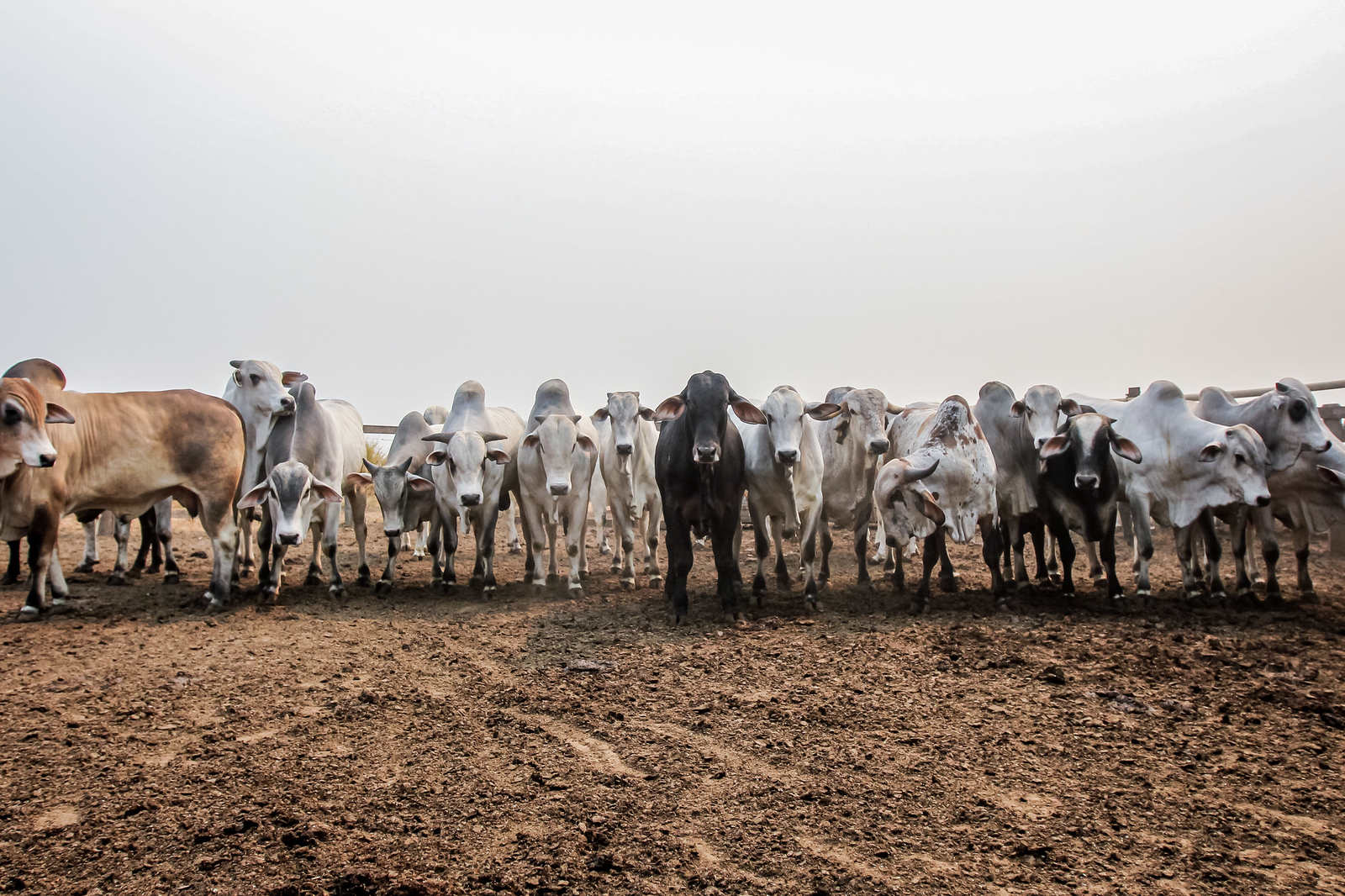Part of the fire devastating the Pantanal in Mato Grosso started in farms whose owners sell cattle to former minister and former senator Blairo Maggi’s Amaggi group and to the Bom Futuro group, which belongs to Eraí Maggi, considered the world’s largest soy producer. These two business groups, in turn, supply multinational giants JBS, Marfrig and Minerva.
Repórter Brasil’s survey was based on a study conducted by the NGO Instituto Centro de Vida (ICV), which found that the fires in Mato Grosso started in five properties. It was based on data on outbreaks pointed out by INPE (Brazil’s National Institute for Space Research), images from Sentinel-2 and Planet satellites, and NASA’s mapping of fire-affected areas. The ICV study analyzed outbreaks in Mato Grosso between July 1 and August 17 but points out that the first fire in the region started on July 11. Based on the farms’ geolocation, Repórter Brasil used data from the Rural Environmental Register (CAR) and the State Finance Department to identify their owners as well as buyers supplied by two of them.
The fires that started in these five cattle ranches – all located in Poconé, 100 km from the state capital Cuiabá – destroyed 116,783 hectares, an area the size of Rio de Janeiro. Such massive destruction corresponded to 36% of the total area affected by fires in Mato Grosso’s Pantanal in the period examined (July and the first half of August).
Brazil’s Federal Police is investigating Pantanal fires by looking into ranches in the rural area of Corumbá, state of Mato Grosso do Sul. The ICV study, however, focused on the neighboring state of Mato Grosso, around the town of Poconé.
These five rural properties in Mato Grosso include Raimundo Cardoso Costa’s Comitiva Farm, where the fire started on July 20 and at least 171 outbreaks were found. A 25,188-hectare area was destroyed by the fire that started on that farm.
According to data from the Mato Grosso State Finance Department, Raimundo Cardoso Costa owns another farm, close to the Committee Farm, called Recanto das Onças. Repórter Brasil found that it has sold cattle to the Bom Futuro group, known for its soy production but which has 130,000 cattle of the Nellore breed. Bom Futuro supplies cattle to the Brazil’s largest meatpacking companies – JBS, Marfrig and Minerva – as shown by documents to which Repórter Brasil had access.

Another ranch located in Poconé and one of the five properties examined by Repórter Brasil is José Sebastião Gomes da Silva’s Espírito Santo Farm, where the fire started on August 4. Inpe informed that at least 73 outbreaks destroyed 14,292 hectares, according to NASA.
Gomes da Silva also owns the Formosa Farm. The property sells cattle to Elza Junqueira de Carvalho Dias’s Rio Bonito farm, which resells cattle to JBS and Marfrig. The Formosa Farm is also a supplier of Amaggi Pecuária. The company is part of the Amaggi group, which belongs to the family of politician Blairo Maggi, owner of ten farms in Mato Grosso and operating in several sectors besides soy and livestock – such as energy and logistics. Amaggi Pecuária, in turn, is a JBS, Marfrig and Minerva supplier.
Last week (14), a Federal Police team from Corumbá, Mato Grosso do Sul – a state that also includes the Pantanal biome – searched and seized four farms, suspecting that the fire was intentionally caused to create pastures. The police investigate if something happened to the Pantanal that was similar to the ‘Fire Day’– when farmers and businessmen from Novo Progresso, Pará, organized fires in the Amazon on August 10-11, 2019.
“We want to find out who the perpetrators [of burnings in the Pantanal] were,” police chief Daniel Rocha told Repórter Brasil, referring to the fact that the fires that are destroying the biome would have been caused by human action rather than natural drought. The properties investigated by the Federal Police under the Matáá operation are close to the Pantanal National Park, on the border of the two states – and, according to Rocha, are large cattle states.
Fire is the cheapest way to expand pastures, as explained by the executive director of Friends of the Earth – Brazilian Amazon, Mauro Armelin. He says that meatpacking companies should also look into their indirect suppliers as a way to curb deforestation and fires caused by human action. “If meatpackers do not carry out full analyses and monitor their indirect [suppliers], they will never be able to say that their supply chains are free from deforestation,” he explains.
More than a hundred meatpackers have signed an agreement with the Federal Prosecution Service (MPF), known as ‘the Meat Plea Deal,’ in 2009, pledging not to buy cattle from areas deforested or sanctioned for using slave labor in the Amazon. More than 10 years later, the companies have managed to circumvent the agreement with a series of tricks that often involve indirect suppliers with socio-environmental issues, as Repórter Brasil showed in an article published in June.
‘Fire started with a car explosion,’ says cattle rancher
Raimundo Cardoso Costa told Repórter Brasil that the fire on his property started after a vehicle exploded. “Firefighters put it out, but it remained on the roots of plants and then it spread,” he says. He also said that it destroyed 40% of his property’s 15,000 hectares and spread to other farms.
Costa complains about environmental legislation and says that burnings should be allowed off the dry season. “You have to let Pantanal people clean what they have to clean,” he says. He also says that he would never set fire to his own farm because native forest works as a natural fence, and without it, he would have to spend R$ 10,000 to build each kilometer of fence – his farm, according to him, would need 50 kilometers.

He lives in São Paulo but has owned farms in the Pantanal for 10 years, with 1,200 heads of the Nellore breed. He is a typical indirect supplier, selling cattle mainly to other ranchers who fatten them up before reselling them to meatpackers for slaughter. He claims to have sold the Recanto das Onças farm, but he is still listed as its owner in a document from the State Finance Department. However, he confirmed that he negotiated, on several occasions, with the Bom Futuro group – supplier of JBS, Marfrig and Minerva.
Costa complains about ranchers being blamed by fires. “They are berating us. People from Pantanal have always taken care of it,” he says. He is also a supporter of President Jair Bolsonaro. “Bolsonaro is blamed for everything that happens in Brazil. The media thinks that the worse the better. We have to help the president improve Brazil.”
Repórter Brasil contacted a lawyer working for another farmer, José Sebastião Gomes da Silva, but received no reply until this article was finished.
Amaggi, which buys cattle from José Sebastião Gomes, informed Repórter Brasil that it will suspend purchases pending investigation of his responsibility for the fire outbreaks in other of his properties.
Minerva Foods pointed out that “agricultural producers are also affected by major fires, which can affect their properties.” The company said that its direct suppliers (Amaggi and Bom Futuro) are fully regular, but it did not comment on indirect suppliers (Costa and Gomes).
Marfrig owns the Montana and Bassi brands. It stated that it uses a satellite platform to monitor suppliers with fire outbreaks and that it has issued an alert suspending cattle purchases until the situation is clarified, but that it cannot fully control indirect suppliers. The company recognizes the issue as ‘critical’ and launched, in July, a program to try to solve it.
JBS, owner of brands Friboi, Seara, Swift and Doriana, said that it can only monitor suppliers that sell directly to the company since it does not have access to Animal Transit Guides (GTAs) of previous links in the chain. Without the information on those documents, the company understands that “any conclusion from JBS on the origin of the cattle acquired from these suppliers would be ill-judged” (Read all statements in full).
The Bom Futuro group did not answer Repórter Brasil’s request for a statement.
Overwhelming destruction
This year’s Pantanal fires are the largest since INPE started recording them 1998. Until last Wednesday, there had been almost 16,000 outbreaks – 56 percent higher than 2005, the worst year in the time series. The fire destroyed 15 percent of the region, with 2.3 million hectares of the world’s largest wetland.
Pantanal’s native fauna suffers the most. There are 1,200 different species of animals, 36 of which are threatened with extinction. The victims include snakes, alligators, monkeys, and jaguars. The fires have already decimated a blue macaw haven and are advancing over a jaguar protection area.
“When I arrived in Poconé, around midnight, the town was shrouded in darkness. The smoke was so heavy that I thought it was the morning mist. It was not. It was the effect of over 2 million hectares burning in the Pantanal,” photographer João Paulo Guimarães told Repórter Brasil.

